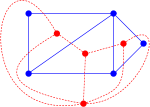I just listened to a talk given by Virginia Chaitin that can be found on academia.edu. The title of the talk is A philosophical perspective on a metatheory of biological evolution. In it she outlines Gregory Chaitin’s work on metabiology, which has been the subject of some of my previous posts – here, here, and […]
|
|||||
|
A recent issue of New Scientist featured an article by Kate Douglas with the provocative title Nature’s brain: A radical new view of evolution. The limits of our current understanding of evolution, and the alternative view discussed in the article, are summarized in this excerpt: Any process built purely on random changes has a lot […] 
A recent discovery in the history of science and mathematics has prompted a number of articles, links to which are provided at the end of this text. Astrophysicist and science historian Mathieu Ossendrijver, of Humboldt University in Berlin, made the observation that ancient Babylonian astronomers calculated Jupiter’s position from the area under a time-velocity graph. […] I’ve been reading Rebecca Goldstein’s Incompleteness: The Proof and Paradox of Kurt Gödel which, together with my finding David Mumford’s Why I am a Platonist, has kept me a bit more preoccupied, of late, with Platonism. This is not an entirely new preoccupation. I remember one of my early philosophy teacher’s periodically blurting out, “See, […] 
I’m not sure what led me to David Mumford’s Why I am a Platonist, which appeared in a 2008 issue of the European Mathematical Society (EMS) Newsletter, but I’m happy I found it. David Mumford is currently Professor Emeritus at Brown and Harvard Universities. The EMS piece is a clear and straightforward exposition of […] Looking through some blog sites that I once frequented (but have recently neglected) I saw that John Horgan’s Cross Check had a piece on George Johnson’s book Fire in the Mind: Science, Faith, and the Search for Order. This quickly caught my attention because Horgan and Johnson figured prominently in my mind in the late […] I think often about the continuity of things – about the smooth progression of structure, that is the stuff of life, from the microscopic to the macrocosmic. I was reminded, again, of how often I see things in terms of continuums when I listened online to a lecture given by Gregory Chaitin in 2008. In […] My last post focused on the kinds of problems that can develop when abstract objects, created within mathematics, increase in complexity – like the difficulty of wrapping our heads around them, or of managing them without error. I thought it would be interesting to turn back around and take a look at how the seeds […] I did some following up on the work of Vladimir Voevodsky and for anyone who might ask, “what’s actually going on in mathematics,” Voevodsky’s work adds, perhaps, even more to the mystery. Not that I mind. The mystery emerges from the limitless depths (or heights) of thought that are revealed in mathematical ideas or objects. […] An article in a recent issue of New Scientist highlights the potential partnership between computers and mathematicians. It begins with an account of the use of computers in a proof that would do little, it seems, to provide greater understanding, or greater insight into the content of the idea the proof explores. The computer program […] |
|||||
|
Copyright © 2025 Mathematics Rising - All Rights Reserved Powered by WordPress & Atahualpa |
|||||


Recent Comments